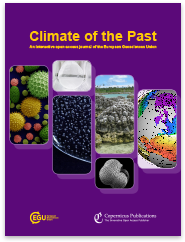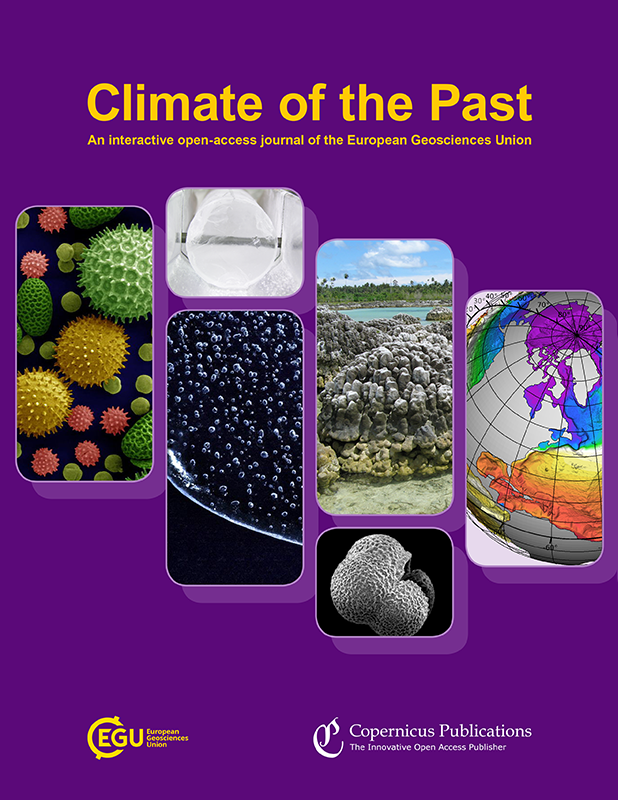Co-editors-in-chief: Irina Rogozhina, Denis-Didier Rousseau & Luke Skinner
eISSN: CP 1814-9332, CPD 1814-9359
Climate of the Past (CP) is a not-for-profit international scientific journal dedicated to the publication and discussion of research articles, short communications, and review papers on the climate history of the Earth. CP covers all temporal scales of climate change and variability, from geological time through to multidecadal studies of the last century. Studies focusing mainly on present and future climate are not within scope.
Journal metrics
CP is indexed in the Web of Science, Scopus, Google Scholar, etc. We refrain from displaying the journal metrics prominently on the landing page since citation metrics used in isolation do not describe importance, impact, or quality of a journal. However, these metrics can be found on the journal metrics page.
News
05 Mar 2026
10th webinar for CP's 20th Anniversary
We are happy to announce the 10th webinar of CP's special webinar series, celebrating two decades of leading paleoclimate science. The webinar on "Paleoclimate of Extreme Events" will take place on Wednesday, 8 April 2026, 17:00 CEST. Please read more. 
05 Mar 2026
10th webinar for CP's 20th Anniversary
We are happy to announce the 10th webinar of CP's special webinar series, celebrating two decades of leading paleoclimate science. The webinar on "Paleoclimate of Extreme Events" will take place on Wednesday, 8 April 2026, 17:00 CEST. Please read more. 
18 Feb 2026
9th webinar for CP's 20th Anniversary
We are happy to announce the 9th webinar of CP's special webinar series, celebrating two decades of leading paleoclimate science. The webinar on "Past volcanism and Climate" will take place on Wednesday, 18 March 2026, 16:00 CEST. Please read more. 
18 Feb 2026
9th webinar for CP's 20th Anniversary
We are happy to announce the 9th webinar of CP's special webinar series, celebrating two decades of leading paleoclimate science. The webinar on "Past volcanism and Climate" will take place on Wednesday, 18 March 2026, 16:00 CEST. Please read more. 
05 Mar 2026
| Highlight paper
Evaluation of nine gridded daily weather reconstructions for the European heatwave summer of 1807
Peter Stucki, Stefan Brönnimann, Noemi Imfeld, Lucas Pfister, Conall E. Ruth, Yannis V. Schmutz, Yuri Brugnara, Martin Wegmann, Rajmund Przybylak, and Janusz Filipiak
Clim. Past, 22, 517–540, https://doi.org/10.5194/cp-22-517-2026,https://doi.org/10.5194/cp-22-517-2026, 2026
Short summary
Highlight articles
05 Mar 2026
Evaluation of nine gridded daily weather reconstructions for the European heatwave summer of 1807
Peter Stucki, Stefan Brönnimann, Noemi Imfeld, Lucas Pfister, Conall E. Ruth, Yannis V. Schmutz, Yuri Brugnara, Martin Wegmann, Rajmund Przybylak, and Janusz Filipiak
Clim. Past, 22, 517–540, https://doi.org/10.5194/cp-22-517-2026,https://doi.org/10.5194/cp-22-517-2026, 2026
Short summary
09 Jan 2026
Historical Droughts in British Colonial Belize (1771–1981)
Oriol Ambrogio Gali, Sarah E. Metcalfe, Elizabeth A. C. Rushton, Betsabé de la Barreda-Bautista, Georgina H. Endfield, Sofia Márdero, Franziska Schrodt, and Alec McLellan
Clim. Past, 22, 25–47, https://doi.org/10.5194/cp-22-25-2026,https://doi.org/10.5194/cp-22-25-2026, 2026
Short summary
06 Nov 2025
Holocene land cover change in North America: continental trends, regional drivers, and implications for vegetation–atmosphere feedbacks
Andria Dawson, John W. Williams, Marie-José Gaillard, Simon J. Goring, Behnaz Pirzamanbein, Johan Lindstrom, R. Scott Anderson, Andrea Brunelle, David Foster, Konrad Gajewski, Daniel G. Gavin, Terri Lacourse, Thomas A. Minckley, Wyatt Oswald, Bryan Shuman, and Cathy Whitlock
Clim. Past, 21, 2031–2060, https://doi.org/10.5194/cp-21-2031-2025,https://doi.org/10.5194/cp-21-2031-2025, 2025
Short summary

31 Jul 2025
Characterization of the 1966 Camp Century subglacial core: a multiscale analysis
Catherine M. Collins, Nicolas Perdrial, Pierre-Henri Blard, Nynke Keulen, William C. Mahaney, Halley Mastro, Juliana Souza, Donna M. Rizzo, Yves Marrocchi, Paul C. Knutz, and Paul R. Bierman
Clim. Past, 21, 1359–1381, https://doi.org/10.5194/cp-21-1359-2025,https://doi.org/10.5194/cp-21-1359-2025, 2025
Short summary
More highlight articles  All EGU highlight articles
All EGU highlight articles 
Notice on the current situation in Ukraine
To show our support for Ukraine, all fees for papers from authors (first or corresponding authors) affiliated to Ukrainian institutions are automatically waived, regardless if these papers are co-authored by scientists affiliated to Russian and/or Belarusian institutions. The only exception will be if the corresponding author or first contact (contractual partner of Copernicus) are from a Russian and/or Belarusian institution, in that case the APCs are not waived.
In accordance with current European restrictions, Copernicus Publications does not step into business relations with and issue APC-invoices (articles processing charges) to Russian and Belarusian institutions. The peer-review process and scientific exchange of our journals including preprint posting is not affected. However, these restrictions require that the first contact (contractual partner of Copernicus) has an affiliation and invoice address outside Russia or Belarus.




